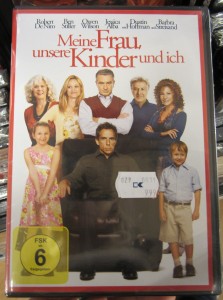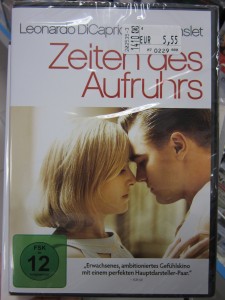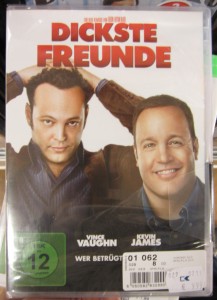Who doesn’t like a good wine tasting? Freiburg is not northern California, but wine is wine right? The event was put together by our language school, who boasted that all the wines would be local to the area. There were 12 people total, including us. The levels of German proficiency were quite diverse: four beginners, at least two native speakers, and the rest were somewhere in between.
We all sat at one very long table, Joe and I at the end. The “Wine Doctor” came in and started pouring the wines and giving his presentation….alles auf Deutsch. Joe and I sat and listened and picked out words we knew or had heard before. I grabbed a “pineapple” in there somewhere, although I am not quite sure what the pineapple was supposed to be doing because I didn’t taste any in the wine.
No one said a word. No one tasted the wines. We just sat there, feeling awkward. Finally, a German-native asked if we could go ahead and taste. A sigh of relief. Three samples of white wine came and went and the chatter started to get a little louder. Out came three red-wines. As the amount of wine consumption increased, so did the conversation amongst the group, and the fluidity of speaking German.
A little bit of alcohol-induced social courage goes a long way. Thus is the theme of the rest of the evening.
I have almost finished my three red wines when I notice that the Italian sitting across from Joe has not made a dent in any of her glasses. I want to say to her: You don’t like red wine? I think to myself, Ok, you know all these words; you know how to put the sentence together, so just ask her. I decide to try it out on Joe first, “Du magst nicht rotwein?”. He changes my nicht (negative used only with verbs) to kein (negative used only with nouns). Then I correct myself – a yes/no question has to start with the verb. Final version of the sentence: Magst du kein rotwein? I try it over several times with Joe and then finally ask her. She understands!!
She doesn’t like red wine, its too strong, and offers me her glass. I politely decline. “Nein, danke.”
So then we get to talking. Where do you live, why are you learning German, etc. Another Italian girl says that she wants to speak in English, but can only think of the words in German. I tell her that I want to speak in German, but can only think of the words in Spanish. Things are looking ok….this is a quasi-conversation….auf Deutsch!
Then Joe starts to talk. He leans in and begins to say (auf Deutsch), “My teacher says 95%……” He is interrupted from across the entire table. “Fünf und neunzig Prozent!” An intermediate speaker over hears this tid-bit and wants to know what bold statement is going to be made next. The entire table goes silent and Joe is left to make his point…auf Deutsch.
Although this is not the first time Joe has captivated a crowd, it is the first time his newly acquired German has been put on the spot. He continues. “My teacher says 95% of women don’t like beards.” How prolific. He pets the ear-to-ear growth he has been working on for a few weeks, now that he is sans a daily flight-suit. The ladies at the table begin an uproar. Some agree whole-heartedly. Others protest defiantly, “Nein, nein, nein!” So, what does Joe do? Classic move here. He goes around the table and takes a survey of which ladies like the beard and which do not…auf Deutsch!
Ironically, I am the last lady to be surveyed. They laugh that I have to like it because I am the “Frau”. I don’t even answer because I am still stuck on how we went from red wine to beards.
Next step: Dinner. We find a new place in town that we have not tried and successfully order our meal and drinks…auf Deutsch. If we butchered any words, the waitress was nice enough not to say anything. What we thought we wanted showed up at the table, so it couldn’t have been that bad. Paying for meals in Germany is interesting. You have to ask for the bill and then be ready to pay immediately. They don’t leave it on the table for you to calculate and stew over, or divide up with friends, and no one uses credit cards. So have your cash in hand!
Small tips are given as well, but only a tourist leaves money on the table. When the waiter arrives with the bill and his/her change purse, you have to decide what you want the tip to be and then ask for change from the total amount. For example, if your bill is €38,40 and you have a €50 note, you need to ask the waiter for change from €40. If you are a scrooge, there is no hiding it in German restaurants. If you don’t know your numbers…auf Deutsch…there is no hiding that either. Not a problem tonight!
Final step: Cocktails. Here is where the characters got a little interesting and the German was flowing. We order successfully and chat with each other, until the gentleman next to us starts asking questions. He goes on and on…auf Deutsch…about how he was all over the US in 1980. He asks us our ages and laughs at the responses. At least Joe was alive when he was there! He buys us two Kölsch beers because it is the best in Germany. Then he recruits another poor sap and engages in a discussion about the best beer in Germany. This guy thinks Rothaus Tannenzäpfle is the best. Here come several bottles of that!
Deep breaths, its just beer Trysta. Thank goodness Joe swapped my mostly-full bottles for his nearly-empty ones because I was struggling. The German was coming pretty easily though. I stood up on my stool and asked the bartender if he had The Captain….auf Deutsch…without even thinking about it. “Haben Sie Captain Morgen?” He laughed and said no and then returned a minute later rattling off about something. Joe thinks he asked me why I didn’t like Whiskey. He could have asked me to get up on the bar and act like The Captain for all I know. What followed was a mess of a Birthday Boy bearing “Geschenke” of more beer, a girl asking us to join someone at another bar, and a shoe-less jaunt in the Bächle.
Eventually, we reached the other side of the bell curve…auf Deutsch. Everyone was talking too fast, the articulation was getting sloppy, and we had tapped out our vocabulary. What was really funny was thinking back to what my teacher had said just that afternoon in class. He encouraged one beer while doing our homework “to loosen up the jaws”, but not three or four or five. He always asks, every Monday morning, what we did over the weekend.
How am I going to explain this…auf Deutsch?








